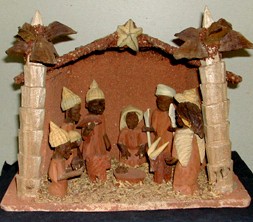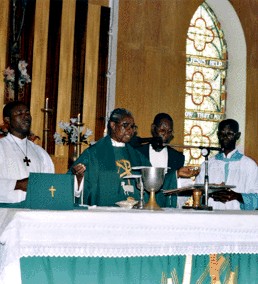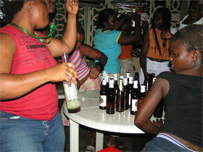|
West Africa Culture - Arts | Society Christmas "unique in West Africa"
Despite being one of the world's freshest christianised regions, West Africa is very rich in local Christmas traditions. Many have their roots in pre-Christian cultures, like the masquerades in Sierra Leone and Nigeria, while others are Africanised yuletide traditions practices all over the world.
Afro-Americans in the US and the Caribbean very often have looked to Sierra Leone when trying to create their own non-European Christmas traditions. Historians say that masquerade parties with roots in Sierra Leone were performed at Christmas time among many slaves brought to the New World, and some families nowadays try to find inspiration in these West African Christmas customs. In nearby Gambia, masquerades are also developing into a Christmas tradition. "In The Gambia, Christmas celebration goes beyond a religious issue, as non-Christians, even Muslims, join us to celebrate the season in grand style. It is a moment of happiness when we roam about in the streets with a masquarader locally called 'Agugu', dancing as well as asking people to donate us," Anna Gomez told afrol News. "And all the monies we gathered are normally used to finance a grand party on New Year's Day," she reveals. But Christmas in The Gambia is also serious business. "Ahead of Christmas, we do a lot of preparations such as shopping all types of things we might need for the period. We also exchange goodwill messages to our neighbours, spread out charities to the poor and needy and even visit people," Ms Gomez says. Also in parts of Nigeria - the West African country with most Christians - old-rooted masquerade parties are part of Christmas celebrations. Nigeria has an enormous cultural diversity, meaning that each people has its own Christmas traditions. Most have masquerades, which often are performed by children, while others have integrated old dances in the celebrations. But something is common all over the country. Christmas in Nigeria means travelling home to the family and transports to every corner of the country are booming ahead of 24 December. Further, the traditional "Ekon Play" has become popular in almost the entire country. Also Christmas decorations have found a national standard, with palm fronds on houses, streets, shops and churches. According to ancient traditions, palm fronds symbolise peace. For most Nigerians, Christmas is arriving home in the village or suburb, meeting again old friends and the extended family, and eating a good meal of beef, goat, sheep, ram or chicken with the family at home. There is also time observe a midnight mass and watch the Ekon Play, where a drama group dances with a baby doll, symbolising the Christ child, that spectators may hold for a small donation. After receiving presents, old and young participate in street life with rousing parties during a couple of days. So while most Europeans and Americans long for a snowy "white Christmas", exiled Nigerians dream of the dry Harmattan winds that blow over Nigeria from the desert during the season. Christmas is the most important annual celebration for Christians in the country, and Nigerians abroad find it difficult to cope with missing family, friends, the heat and parties. Christmases in the village were "fun and hold such lovely memories," a Nigerian blogger holds. "Christmas is the most enjoyable moment in Nigeria. Its period is marked by endless festivities and merrymaking," Johnson Adebajo agrees. As new traditions steadily are blended into the Christmas celebrations, Nigerians "tend to forget about the spiritual aspect of it," he told afrol News. "Of course, we go to the church, but Christmas is a moment for shopping, dancing, drinking alcohol and enjoyment for people." In Ghana, Christmas is more focused on the religious message, although some of the country's many ethnic groups have large feasts lasting for two weeks, beginning on 20 December. A ve
Also in Côte d'Ivoire and Benin, Christmas celebrations mostly centre on religious aspects, and as in Ghana, the commercialised tradition is often absent. Rural church representatives describe the Ivorian Christmas as "discrete", given recent religious tensions in the country. The midnight mass is the central event, and those able to afford it gather the family around an expensive European dish. But in Abidjan, Christmas is mostly connected with heavy partying among Ivorian youths. Honoré Essoh told afrol News that "in the past, people used to go back to their villages to celebrate Christmas and the New Year," being "an occasion for the entire family to meet and talk." And in the villages, "young people would gather in a place and party all night long with alcohol and music." Nowadays, less people go to their villages and celebrations have become more urban. On 25 December and on 1 January, family members who live in the same city gather in the house of one of the elderly to eat and drink, says Mr Essoh. "Apart from that young people spend most of their time in a special kind of bar, which mostly are without roofs and are called 'maquis', and also in night clubs." "Ivorians are the heavy drinkers and showmen in Africa," he adds, and the maquis experience good times during Christmas. Girls and boys don't miss any trick to find money for drinks. "Those who are at school lie to their parents saying they have to buy some books or other things to have money," Mr Essoh reveals, adding that parties in the maquis go on all night long. In Benin, religious sermons dominate Christmas celebrations, although some villages include Nigerian-like dancing and masquerade parties. In neighbouring Togo, where over 40 percent are Christians, the French Christmas traditions have taken a dominant role. Contrasting other West African countries, Santa Claus and Christmas trees have become part of traditions. Only Christmas dishes are truly Togolese. Even in the Muslim-dominated Sahel, some villages have started celebrating Christmas. Small groups in Burkina Faso and Mali are blending African religious practices with the Christian faith and have come up with unique Christmas traditions. Here, new traditions are still in the making! The Dogon people in southern Mali, where Islam, Christianity and African religions exist side by side in most villages, are blending masquerades from an ancient death cult and traditional songs and dances with midnight masses and a local lamb dish inspired from biblical tales. In many Burkina Faso villages, children are at the centre of one of the world's newest Christmas traditions. With a mixture of clay, straws and water, kids build architectonic masterpieces outside their compounds, illustrating the biblical theme of the crib. The nativity scenes are highlights in village decoration and stand until the rains slowly wash them away, close to Easter. West and Central Africa is the world's densest region when it comes to cultural multiplicity. And this is also slowly expressing itself when it comes to Christmas traditions, despite the fact that serious missionary work did not start here until 150 years ago. The region thus also must hold records in cultural creativity. While each year sees new traditions being established, the Americanised "world culture" of Santa Claus has yet to threaten this rich variety. West African rich Christmas traditions even have it in them to become a tourist attraction and should be a serious candidate for Unesco's World Heritage list. By Rainer Chr Hennig & Musa Saidykhan © afrol News - Create an e-mail alert for West Africa news - Create an e-mail alert for Culture - Arts news - Create an e-mail alert for Society news
On the Afrol News front page now
|
front page
| news
| countries
| archive
| currencies
| news alerts login
| about afrol News
| contact
| advertise
| español
©
afrol News.
Reproducing or buying afrol News' articles.
You can contact us at mail@afrol.com










